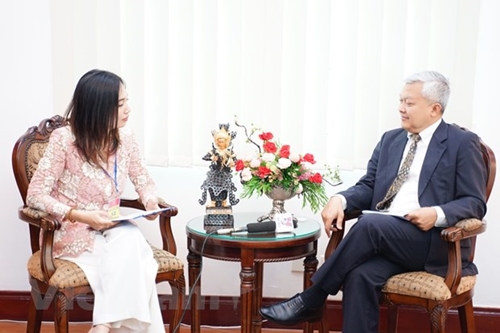Granting an interview to the Vietnam News Agency on the occasion of the 53rd founding anniversary of ASEAN (August 8, 1967-2020), Ambassador Ibnu Hadi stressed that since its establishment, ASEAN has grown tremendously and significantly in terms of positive significant development.
    |
 |
|
Indonesian Ambassador to Vietnam Ibnu Hadi at the interview |
“During its cause of development, a lot of progresses have been achieved in terms of political and security with its Treaty of Amity and Cooperation (TAC). This is like a tool created by ASEAN to contribute to the peace and stability of the world and our region,” he noted.
Emphasising the importance of TAC, which was signed on February 24, 1976 by ASEAN member countries, he said the treaty is now joined by 40 countries, including the five permanent members of the UN Security Council.
In terms of economic and trade, the ambassador said ASEAN already created the ASEAN Free Trade Area (AFTA) in 1992 and it has been fully implemented, including for the CLMV countries (Cambodia, Laos, Myanmar and Vietnam).
“We are aiming to have the Regional Comprehensive Economic Partnership (RCEP). Hopefully, that can be signed during the Vietnam’s ASEAN chairmanship by the end of this year. And if that is the case, that will give the strong boost for more economic development for our region,” he added.
In terms of socio-cultural development, the ASEAN Community has already been adopted as a single community, he said, adding that the grouping should encourage more people-to-people contact in order that ASEAN is not only government to government but also people to people. Interactions between people, not only tourism, but also culture, education must be further enhanced.
Regarding the contributions made by Vietnam as rotating ASEAN Chair 2020, especially when the COVID-19 pandemic is ravaging, Ibnu Hadi said Vietnam has shown not only to the ASEAN countries but also to the rest of the world that it’s a good example of how to tackle the COVID-19.
Acknowledging Vietnam’s initiatives to help ASEAN combat the pandemic, he said the country issued the ASEAN’s chairmanship statement on COVID-19 and also organized the online ASEAN+3 Summit (with China, Japan and the Republic of Korea) in April.
“It is ASEAN’s special summit on COVID-19 during which we discussed and came up with some solutions and agreements. During the last ASEAN Summit at the end of June, we issued the ASEAN Leaders’ Vision Statement on a Cohesive and Responsive ASEAN. I believe that among others, we are all committed to tackling the new emerging issues by the COVID-19,” he said.
“So a lot have been contributed by Vietnam to ASEAN,” he stated, expressing his belief that under Vietnam’s chairmanship which lasts until December, ASEAN will have another summit in November and hopefully, the RCEP will be signed.
He also hoped ASEAN will have some progress on the Code of Conduct that is the continuation of the Declaration of the Conducts on the South China Sea (East Sea).
The Indonesian diplomat highlighted Vietnam’s efforts and initiatives in maintaining the cooperation process of ASEAN in the context of COVID-19.
“Unfortunately, there is a COVID-19 outbreak since March. So since then, most of the process of the ASEAN is conducted online. But thanks to Vietnam, all of these processes can be conducted on time,” he noted.
Regarding challenges and opportunities to the ASEAN Community after 2025, Ibnu Hadi stressed that the challenge number one post-2025 is to maintain the peace and stability of this region.
“When we talk about peace and stability, we have to talk about the peace process and peace conditions of our region, not only on land but also in the sea. In the sea we must discuss the East Sea, or South China Sea,” he said.
He held that beyond 2025, not only the completion of the Code of Conduct but how to implement it on the ground are very crucial.
The Indonesian ambassador expected that in the future, ASEAN will consider how to make cooperation agreements with other countries to become a production hub in the Asian region.
Source: VNA